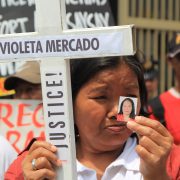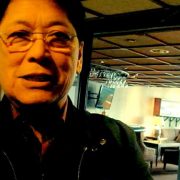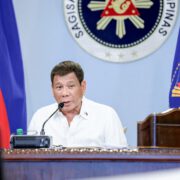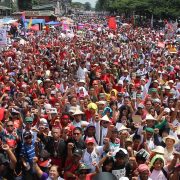STREETWISE: Why peace talks hang in the balance
Streetwise
By Carol Pagaduan-Araullo
Why peace talks still hang in the balance
And so it has come to this. After stoking such high expectations about the resumption of peace talks between the Government of the Republic of the Philippines (GRP) and what the Armed Forces of the Philippines (AFP) considers the top “security threat” in the country today — the Communist Party of the Philippines-New People’s Army-National Democratic Front of the Philippines (CPP-NPA-NDFP) — President Rodrigo Duterte now scoffs at the strength and significance of these revolutionary forces. He also calls their acknowledged leader, Jose Maria Sison, who he had earlier respectfully referred to as his political mentor, “arrogant” for rapping him about giving ultimatums to the revolutionary movement.
During non-stop visits to military camps all over the country, Mr. Duterte in effect tells his audience of military officials and soldiers, in his signature kanto boy style, that he thinks he is doing the CPP-NPA-NDFP a big favor by engaging them in peace negotiations.
Why, he even declared a unilateral ceasefire effective immediately at his SONA, no less.
But the CPP-NPA-NDFP did not reciprocate with its own unilateral ceasefire declaration after he gave a deadline of 5pm last July 30. (The CPP announced it would make a declaration at 8pm).
So Mr. Duterte lifts the GRP’s unilateral ceasefire at 7pm and he tells the military and the police that they can go back to what they have been trying to do for more than four decades; that is, defeat the NPA militarily and decimate the CPP and NDFP cadre corps through a “legal offensive” utilizing fabricated criminal cases. (Not surprisingly, he sounds much less belligerent and derisive of the CPP-NPA-NDFP, if at all, when addressing a non-military audience, such as the PCCRV.)
But wait a minute. Mr. Duterte’s peace adviser Jesus Dureza says the August 20 talks are still on track. So does Mr. Luis Jalandoni, NDFP chief peace negotiator. What is going on here?
As it turns out, a unilateral ceasefire declaration, whether by the GRP or the CPP-NPA-NDFP, was never a precondition to the resumption of the peace talks in Oslo, Norway. As a matter of fact, the consensus reached by the two sides last June 15 (contained in their Oslo Joint Statement) was that the “mode of interim ceasefire” would be discussed when the formal talks resumed in July alongside “an amnesty declaration for the release of all detained political prisoners, subject to the concurrence of Congress”.
Mr. Duterte’s dramatic declaration of a unilateral ceasefire at his July 25 SONA was his big-bang gesture that unfortunately ended in a whimper.
When Duterte’s people failed to communicate to the NDFP the full text of the AFP SOMO (Suspension of Offensive Military Operations) and the PNP SOPO (Suspension of Offensive Police Operations) in a timely manner; military maneuvers and occupation of rural civilian communities continued unabated; an armed clash took place resulting in the death of a member of a notorious paramilitary group — all these contributed to a delay in the CPP-NPA-NDFP’s reciprocal declaration of a unilateral ceasefire.
In the end, Mr. Duterte’s precipitate ceasefire declaration was undermined by his own people as well as his precipitate decision to recall it — two hours after his arbitrary deadline and one hour before the anticipated CPP-NPA-NDFP announcement of its ceasefire.
In the meantime, there have been no releases of the more than 500 political prisoners nationwide and counting. As in zero. Zilch. This, after Mr. Duterte’s ever-so-generous offer to grant a general amnesty in meetings with the NDFP official representative, even before his inauguration. “I know most if not all of them (political prisoners) are being held on trumped-up charges” he reportedly said, priding himself to know, after having been a prosecutor for many years, the quality of justice meted out in Philippine courts.
Twenty two NDFP peace consultants remain behind bars, three of them convicted, on the basis of trumped-up criminal cases. There are more than eighty political prisoners who are sick, elderly, husband-and-wife detainees, or for other humanitarian considerations, deserve to be released immediately.
Like all political prisoners, they are victims of political persecution and an ongoing miscarriage of justice as part of the government’s insidious scheme to deal with political dissenters by illegally arresting them, placing them in indefinite detention until they can be convicted of spurious criminal charges and then made to rot in prison for the rest of their productive lives.
By the way, the easiest way to do this is to plant a piece of grenade in their belongings upon arrest for that makes their case non-bailable. (The grenade is recyclable for the next unsuspecting victim.) No use charging them with the more appropriate political crime of simple rebellion since that is more difficult to prove and is, in fact, bailable.
It goes without saying that they are vilified as “communist terrorists”, murderers, arsonists, robbers, kidnappers and what have you all the better to deny them any kind of public sympathy. (Notably, they do not pin the favorite and most reviled kind of crime of late, illegal drug trafficking, against these activists and revolutionaries because that would indeed be laughable.)
Not that political dissenters are no longer the object or targets of extrajudicial killing by the state’s security forces. It’s just that dealing with the so many “enemies of the state” via this most brutal of means as in the time of President Gloria Arroyo, raised a howl of protest from the local and international human rights community. Too costly politically so the government came up with this “legal offensive” scheme.
The Arroyo regime put up the Inter-agency Legal Action Group (IALAG) tasked to investigate, prosecute, monitor and handle litigation processes of cases involving national security. It ended up as the government agency responsible for fabricating criminal lawsuits against the alleged top leadership of the CPP-NPA-NDFP and even political activists that the government suspects are members or supporters of the revolutionary movement. The IALAG has officially been abolished but its function has been institutionalized in the state’s police, prosecutorial as well as judicial system.
Taken in this light, the call for the release of all political prisoners is valid in its own right.
As a means to forging ahead with the peace negotiations and ultimately achieving a just and lasting peace, their release gains even more urgency and is deserving of the broadest public support. #
Published in Business World
8 August 2016





